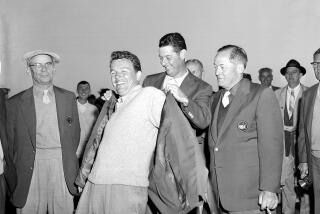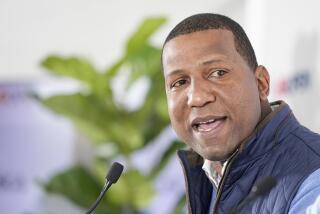Her Master Plan
She is the leader of a women’s group that has zeroed in on forcing the most powerful and historic golf club in the nation to admit its first female member. And now, if that weren’t enough, Martha Burk is threatening to add a new, auxiliary target in her fight: CBS.
The network that has broadcast the Masters the last 46 years has a simple choice, the chairwoman of the National Council of Women’s Organizations said: “They will come down on the side of bigotry, or they can reconsider their position.”
In a Wednesday conference call with the NCWO’s 10-member board of directors, Burk received approval to appeal to CBS and the USA Network that they drop coverage of the Masters “and stop underwriting discrimination.”
And the married, 60-year-old mother of two boys isn’t stopping there. She wants to examine the makeup of the decision-making group at CBS that has said it plans to go ahead and televise the Masters when it is played at the private Augusta National Golf Club next April.
“How many women are in top management as opposed to the clerical pool, and how much are they paid?” Burk said in a telephone interview.
Sean McManus, president of CBS Sports, declined to comment when reached at his home Wednesday night. Earlier in the day, CBS issued a statement that it plans to continue televising the event--news that came as no surprise to the many media insiders who seem convinced that another network would quickly move to pick up the coverage if CBS backed out.
Before Wednesday, Burk and her group had, with some success, concentrated their efforts in trying to dissuade sponsors Citigroup, IBM and Coca-Cola from supporting the tournament.
Hootie Johnson, Augusta’s president, responded last Friday by dropping television sponsorship for 2003. That way, he said, the sponsors wouldn’t be “pressured” by the women’s groups.
But that announcement, and the timing of it, has only raised Burk’s ire. She suggested that by choosing the start of a holiday weekend to make his proclamation, Johnson was trying to avoid a spotlight.
“They thought it would be all over by Tuesday, they could hit when the other guy can’t hit back, that this would die a natural death,” Burk said.
Burk, who advances her case with a wit as dry as the summer in her East Texas hometown of Tyler, hasn’t let that happen. And as the point person of a crusade backed by an umbrella organization that represents some 160 women’s groups, she now has other targets in mind.
She intends to contact Augusta National members and find out who pays their dues. If it’s a corporation, she said she will contact it. She also expressed optimism that some members of the men’s professional tour might speak out against the private club.
Those hopes took a hit Wednesday when former Masters champion Mark O’Meara and three other PGA Tour players said they would not pressure the 70-year-old club to admit women as members.
Augusta “is a private club and they can choose who they want to include,” said O’Meara, the 1998 Masters and British Open champion. “If you don’t like the policy, don’t go to the tournament.”
Bob Tway, Mike Weir and Scott Verplank, in interviews at the Canadian Open, also defended Augusta. Verplank said the NCWO should be concerned with more important women’s issues.
“Why aren’t they doing more for women in Afghanistan?” Verplank said.
Burk said her group has raised millions in support of women’s rights in Afghanistan, but that it is also interested in breaking bastions of all-male clubs. “Nobody can accuse me of not dealing with real issues,” Burk said. “If [golfers] don’t want to step across the line for women, that’s sad.”
So far, support has been no less forthcoming from the women’s tour. Amy Alcott, a member of the LPGA’s Hall of Fame, said the two times she has played Augusta are “a true highlight” of her career. “I was treated with the utmost respect,” Alcott said
“I feel it would be great, and also keeping with the times, to have women as members. But it’s not easy for a man to be admitted either. It’s a private club that should be able to have its own guidelines for membership.”
Tour veteran Dottie Pepper, interviewed by Dan Patrick on ESPN radio on Wednesday, also defended Augusta’s right to remain private.
Few expect such comments to deter Burk, who, despite some early setbacks, still considers the stance taken by Johnson and Augusta to be an unpopular one. “I’m at a loss [to explain it],” she said. “And I’ve got a PhD in psychology.”
Burk has been an available, quotable news subject since the issue of whether all-male Augusta National, where the Masters is played each April, ought to admit women as members was raised earlier this month. Women are allowed to play the course only as guests of a member.
“I think it’s the 21st century,” said Burk, who played golf as a youngster but no longer does. “These guys need to come into it.”
Burk and the NCWO, which represents such women’s groups as the League of Women Voters, the National Organization for Women, the Assn. of Junior Leagues International, the American Assn. of University Women and the YWCA, are offering a push.
The 22-year-old NCWO is “a well-respected umbrella of women’s activism in social and political issues,” according to Richard Lapchick, chairman of the Devos Sport Business Management Program at the University of Central Florida and Director Emeritus of the Center for the Study of Sport in Society at Northeastern University.
Burk graduated from the University of Houston in 1962 and earned her Masters degree at the University of Texas at Arlington, where she also earned her doctorate. She is a licensed psychologist in Texas.
A democrat, Burk was on the national board of directors of the National Organization for Women from 1988 to ’90 and served on the National Task Force on Pay Equity. She also was president of the Center for the Advancement of Public Policy until she became chairman of the NCWO.
Kim Gandy, president of the National Organization of Women, said Burk is a skilled administrator.
“She’s a very good negotiator,” Gandy said. “She’s just so good about handling all the various concerns in our organization. And we’re all concerned with making women’s lives better.”
Gandy says that Burk’s fight is not hers alone, but belongs to all the women’s groups in the organization.
“I think it’s important,” she said. “Somebody asked me, ‘Doesn’t the movement have bigger fish to fry?’ Bigger fish to fry than discrimination against women? These people discriminate against women and they do it quite blatantly.”
Burk was once editor of a newsletter called the Women’s Action Connectiv, formerly Washington Feminist Faxnet, which encouraged “action” to advance women’s equality.
Now, Burk is intent on trying to earn her second Masters degree, although certainly a different one than before. She points out that Augusta National has a legal right to exclude women.
“This is not a legal issue,” she says. “This is a moral issue.”
And Burk clearly intends to press on and take the fight wherever necessary. She was in rural Maine attending a conference when Johnson announced Augusta would exclude its Masters television sponsors. Burk’s cellular phone had no service, but when she finally could use it, her message box was full.
Eager to respond to Johnson’s move, Burk drove 90 minutes early Saturday morning to a town with a television station equipped to conduct a satellite interview.
Said Burk: “I think it was the biggest thing in town for quite a while.”
Times staff writers Larry Stewart and Peter Yoon contributed to this report.
*
More to Read
Go beyond the scoreboard
Get the latest on L.A.'s teams in the daily Sports Report newsletter.
You may occasionally receive promotional content from the Los Angeles Times.










